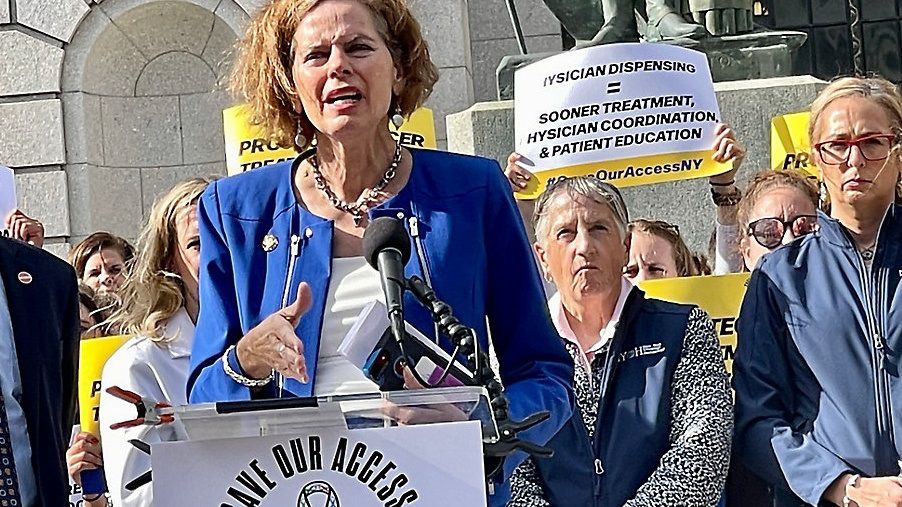Thousands of cancer patients enrolled in Medicaid in New York state are facing an additional hurdle that could impact the efficacy of the treatment intended to save their lives.
Cancer and HIV patients across the state can get their oral medications directly from their physician's dispensary.
But the state health department implemented changes to its policy this year making it more difficult for those dispensaries to get Medicaid reimbursements. This is forcing many cancer patients to use mail-order pharmacies — delaying their prescriptions by several days or weeks.
"We must ensure that individuals battling cancer will receive timely access to their cancer care — the care that saves their lives," said Sabrina Mosseau, New York Oncology Hematology's executive director.
The change took effect Sept. 1.
Physicians, NY Oncology Hematology members and lawmakers rallied outside the state Capitol on Wednesday urging the state health department to reverse the policy.
Physician dispensers and practitioners were encouraged to enroll as Medicaid "prescribers," but they cannot because the state Education Department does not license them with regular pharmacies.
"In oversight, probably, they didn't really, maybe, understand what the ramifications were by trying to change policy," said Nancy Egerton, New York Oncology Hematology's pharmacy director.
The state Medicaid program sent physicians letters this summer alerting them of the change.
It's a personal fight for Assemblywoman Pat Fahy, whose son, Brendan, died after a 20-month battle with a rare cancer earlier this year.
“I know firsthand how it’s a race against the clock when you’re dealing with oncology, prescriptions and related drugs,” she said. "...Every day matters. I can't even fathom if my son had been a Medicaid patient as opposed to having insurance."
Egerton says NYOH had beneficial conversations with the Health Department two years ago when the changes were being negotiated, and were later delayed. But the impact of those discussions were lost amid changes in DOH leadership since.
Health Department officials Wednesday stressed the Sept. 1 changes were made to be in compliance with the federal 21st Century Cures Act, which requires all Medicaid Managed Care providers be enrolled with the Medicaid program to continue providing services.
“This is unequivocally false, as there has been no Medicaid policy change," Health Department spokesman Jeffrey Hammond said in a statement. "As a matter of fact, every Medicaid patient still has the option to receive their oral prescriptions directly from their physician, and Medicaid reimburses all prescribing practitioners for drugs dispensed to patients.”
Physician dispensers in the state are not licensed or registered as pharmacies and can't be enrolled as a pharmacy provider in the Medicaid program.
"There is no change or limitation to accessing these medications for physicians or their patients," Hammond said.
Physician dispensers and practitioners have never been specifically defined in state law, leaving a grey area when it comes to licensing and regulations. Billing physicians and providers as pharmacies would require a change to state education law.
Assemblyman John McDonald III, a pharmacist for several decades, is working to bring the Health Department, health providers, oncologists and others together to talk and find a solution.
Legislation to change the policy would take many months — time advocates say cancer patients don't have.
"I think creating a limited pharmacy license for this particular small window of claims in New York state, and their small practice, makes perfect sense," said McDonald, a Democrat from Cohoes. "But, like anything else, what I think is simple, is not always that easy."
About 7.3 million New Yorkers were enrolled in the Medicaid program last December, National Community Oncology Dispensing Association Executive Director Michael Reff said.
